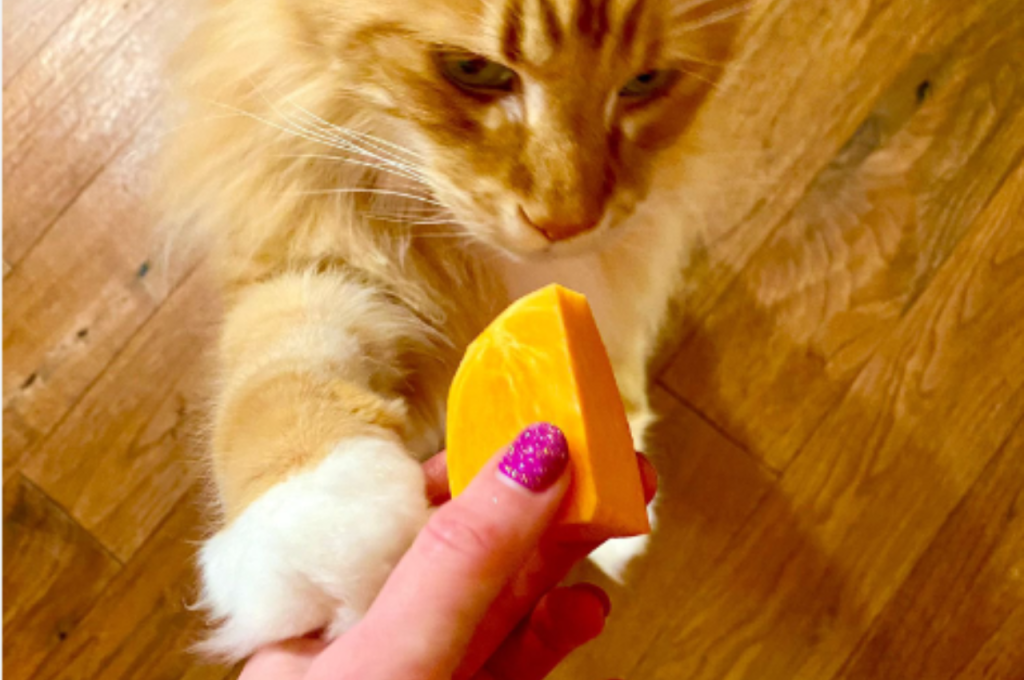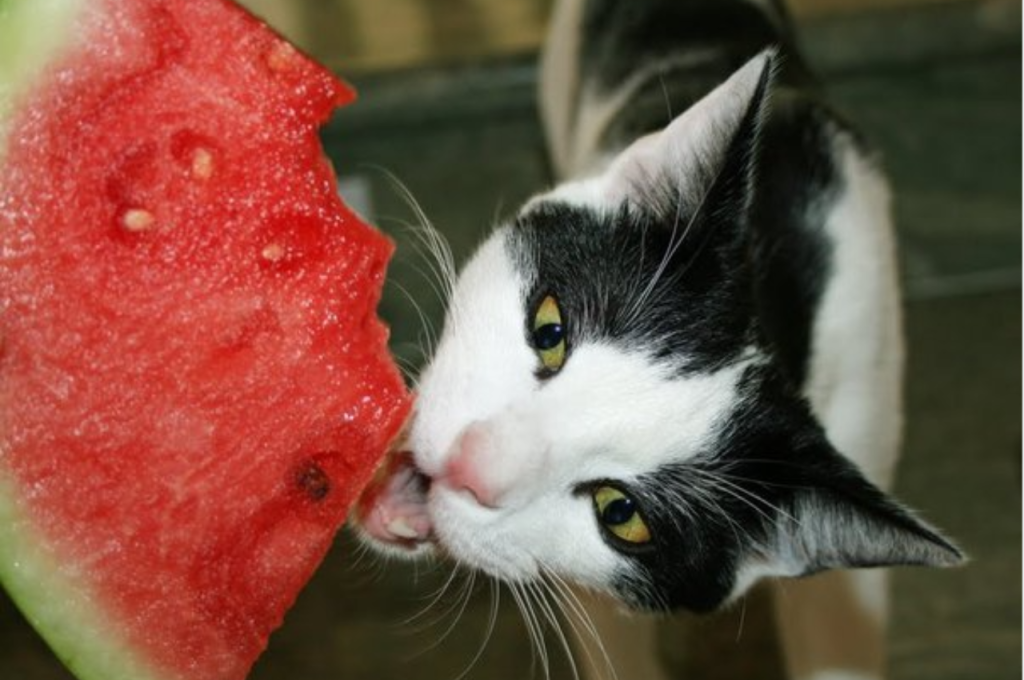Yes, cats can eat mango, but only in small quantities and without the peel or pit. Mangoes are tropical fruits rich in vitamins and minerals, making them a tempting treat for humans and sometimes for our feline friends.
While cats can safely consume small amounts of mango flesh, it is essential to remove the peel and pit to prevent any potential digestive issues or choking hazards. The sweet taste and soft texture of mango can make it an occasional and enjoyable addition to a cat’s diet.
However, remember that it should only be given as an occasional treat and not as a regular part of their meals. As with any new food, it’s crucial to introduce it gradually and observe your cat for any adverse reactions.
Health Benefits of Mango for Cats
While cats are primarily carnivores, and their diet should mainly consist of animal protein, offering them occasional healthy fruits like mango can have some surprising benefits. Mangoes are a delicious tropical fruit that not only humans but also cats can enjoy. However, it is important to note that mango should only be given to cats in moderation and as an occasional treat, as part of a balanced diet.

Vitamin C Boost
One of the key health benefits of mango for cats is its rich vitamin C content. Just like humans, cats cannot produce vitamin C naturally, so they need to get it from their diet. Vitamin C is a powerful antioxidant that helps boost the immune system, providing a line of defense against various infections and illnesses. A small amount of mango can contribute to fulfilling your cat’s vitamin C requirements.
Improved Digestion
Mangoes contain dietary fiber, which can help promote better digestion in cats. The fiber in mangoes aids in regulating bowel movements and preventing constipation. Feeding your cat mango in small amounts can contribute to maintaining a healthy digestive system, ensuring that waste is efficiently eliminated.
Eye Health
Mangoes are packed with essential nutrients such as vitamin A and beta-carotene, which are beneficial for promoting good eye health in cats. These nutrients contribute to maintaining proper vision and preventing eye-related issues that may arise with age. Including a small amount of mango in your cat’s diet can help keep their eyes healthy and vibrant.
Risks and Precautions of Feeding Mango to Cats
Mangoes are a delicious tropical fruit enjoyed by many humans, but when it comes to sharing them with our feline friends, caution is advised. While cats are obligate carnivores and their diet primarily consists of meat, they may occasionally show interest in fruits like mangoes. However, before offering mangoes to your cat, it’s essential to understand the potential risks and take necessary precautions to ensure their well-being.
Allergies
Cats can develop allergies to various foods, including mango. Monitor your cat for signs of allergic reactions like itching, sneezing, or gastrointestinal upset.
Intestinal Upset
Feeding your cat mango in excess can lead to intestinal upset, such as diarrhea or vomiting. Introduce small amounts gradually and observe your cat’s response.
How to Serve Mango to Cats
Cats are known for being curious creatures, and they may show interest in tasting some of the foods that their human friends enjoy. Mango is a tropical fruit that is not toxic to cats, but it should be served to them with caution. If you are considering sharing some of this sweet and juicy fruit with your feline friend, there are a few things to keep in mind when it comes to serving it to them.
Preparation Tips
Before offering mango to your cat, it’s important to prepare it properly. Peel the skin off the mango and remove the pit, as these parts can be difficult for cats to digest. The mango flesh should be cut into small, bite-sized pieces, which will make it easier for the cat to eat and minimize the risk of choking. Wash the flesh thoroughly to remove any chemicals or pesticides that may be present on the skin.
Serving Sizes
When serving mango to your cat, it’s crucial to keep the portion size in mind. Mango should be given to cats in moderation as an occasional treat and not as a regular part of their diet. A small portion, such as a teaspoon of mango, is sufficient for most cats. Overfeeding can lead to digestive issues and an upset stomach, so always be mindful of the serving size.
Alternatives to Mango for Cats
When it comes to exploring alternatives to mango for cats, it’s essential to ensure that any treats or fruits they consume are safe and beneficial for their health. While mango can be a tasty and nutritious treat for humans, it’s crucial to remember that cats have specific dietary requirements that may not align with consuming mango in large quantities. Fortunately, there are several alternatives to mangoes that can serve as healthy options for your feline friend.
Other Fruits
Cats can enjoy a variety of fruits beyond mango. However, it’s important to introduce new fruits gradually and in moderation to monitor any potential adverse reactions. Safe fruits for cats include:

- Apples
- Blueberries
- Strawberries
- Watermelon (seedless and without rind)
Specially Formulated Cat Treats
Specially formulated cat treats are designed to meet the specific dietary needs of felines. These treats are available in a range of flavors and textures, providing a convenient and safe way to reward your cat without risking their health. When selecting cat treats, look for those that are high in protein and low in carbohydrates to align with your cat’s natural diet.
Frequently Asked Questions
Certainly! Here are some frequently asked questions (FAQs) about cats end mango:
1. Can cats eat mango?
Yes, cats can eat mango in moderation. Mangoes are safe for cats to consume as an occasional treat, but they should not make up a significant portion of their diet.
2. How should mango be prepared for cats?
Before offering mango to your cat, ensure that it is ripe, fresh, and free from any pits or seeds. Remove the skin and cut the mango flesh into small, manageable pieces to prevent choking hazards and aid in digestion.
3. Can mangoes be harmful to cats?
Feeding large quantities of mango to cats can contribute to obesity, diabetes, and dental issues due to the fruit’s high sugar content. It’s crucial to offer mango to cats in moderation and as an occasional treat.
Conclusion
Ultimately, moderation is key when feeding mango to your feline friend. Cats can enjoy this tropical treat in small amounts, but it’s important to watch for any adverse reactions.
Always consult your veterinarian before introducing new foods to your cat’s diet for their safety and well-being.
